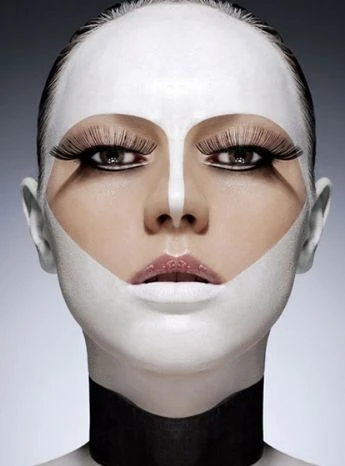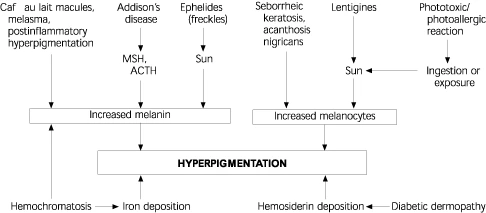Bihaku is a Japanese word that refers to skin whitening or brightening function in beauty products. It literally means “beautiful white”.
Most probably know that whitening beauty products are HUGE in Japan (as well as other Asian countries). It is sort of like the Asian-equivalent of anti-wrinkle products.
What bihaku products do NOT do:
- They do not give skin a whitened appearance!
- They will not permanently or temporarily alter the natural skin colour you were born with. They cannot lighten your natural light brown skin to an alabaster shade!
- They do not contain hydroquinone, mercury, or lead! These ingredients are illegal in beauty products in Japan!
Function and purpose of bihaku products:
There’re slight variations depending on the active(s) used but they all help prevent and fade hyperpigmentation. Pretty much everyone, no matter the age, sex, skin type, or skin tone can greatly benefit from these products.
- Treat (and sometimes also help prevent) localised hyperpigmentation like melasma, acne marks, freckles, age spots, and dark spots.
- Help fade and prevent a tan.
- Brighten and even overall skin tone.
It is automatically assumed (since it is rarely written on the packaging) that users also practice sun avoidance and use proper sun protection daily in addition to using these products. Not doing so can cause an adverse effect!
Quasi-drug is considered a medication and it has a restricted purpose of use. Most bihaku products are categorised as quasi-drugs in Japan so standard laws and import (personal and business) restrictions do apply just like any other medications!
For bihaku quasi-drugs, they contain active ingredient(s) that are approved by the Japanese Ministry of Health, Labour and Welfare (MHLW) to be effective (and safe) for preventing or improving on hyperpigmentation.
These products have stricter ingredient labelling regulations than regular products. For example, if a product contains regular zinc oxide, micronised zinc oxide, and silicone-coated zinc oxide, each has to be clearly identified on the ingredient list in order of quantity instead of simply grouping them together on the labelling as ‘zinc oxide’.
Bihaku actives approved by MHLW that are developed in Japan
They all reduce hyperpigmentation but the process differs. As you can see the chart below, it’s best to pick active(s) that will best treat the type of hyperpigmentation you have.
My sources of info are linked if you are interested in scientific studies and journals which explain each in details. Hover your cursor over the links for more info.
These are all the actives approved for treating hyperpigmentation:
- 4-(4-Hydroxyphenyl)-2-butanol (4-HPB) → It inhibits melanin production.
Developed by Kanebo in 2007 and it is a has been shown to be effective for treating UV-induced hyperpigmentation and brightening and evening overall skin tone. source
- 4-n-Butylresorcinol (Rucinol) → It inhibits melanin production.
Developed by Pola in 1998 and it has been shown to be particularly effective for treating melasma. source, source 2, source 3
E.g. of a product with this as main active: POLA White Shot W
- 5,5-Dipropyl-biphenyl-2,2-diol (Magnolignan) → It decreases melanin production to treat UV-induced and hormone/medication-induced hyperpigmentation.
Developed by Kanebo in 2005 and it is a type of polyphenol with a similar structure as Japanese whitebark magnolia. source, source 2, source 3
E.g. of a product with this as main active: Kanebo Impress IC White Returnery
- Adenosine Monophosphate Disodium Salt (AMP) → It prevents accumulation of melanin in the skin.
Developed by Otsuka Pharmaceutical in 2004 and it speeds up cellular renewal rate to help in skin rejuvenation. source
E.g. of product with this as main active: InnerSignal Rejuvenate Clear-up Mask
- Arbutin → It inhibits melanin production.
Developed by Shiseido in the late 1980s and it is a natural derivative of hydroquinone but it is non-cytotoxic. Source, Source 2
See products that contain this as an active ingredient: HERE
- Chamomilla Extract → anti-inflammatory agent. It inhibits UV-induced hyperpigmentation.
Developed by Kao in the late 1990s and it is the only whitening active from botanical extracts approved in Japan. It inhibits melanin synthesis in melanocytes. Source
E.g. of a product with this as main active: Curél Whitening Moisture Essence
- Ellagic Acid → It inhibits melanin production to treat UV-induced hyperpigmentation.
Developed by Lion Corporation in the mid-1990s and it is a naturally occurring polyphenols found in certain plants. Its mechanism is similar to kojic acid. Source
E.g. of a product with this as main active: Helena Rubinstein Age White Reverser Superior Serum (a.k.a. AG White Reverser Concentrate).
- Kojic Acid → antibacterial agent. It inhibits melanin production with very mild antioxidative effect.
Developed in the late 1980s and it is a by-product of Japanese sake’s fermentation process. In 2003, MHLW briefly warned against using kojic acid due to the possible carcinogenic effects but after further revaluation in 2005, it has been deemed safe as a cosmetic ingredient and continues to be widely used.
E.g. of a product with this as main active: Albion IGNIS Whitening Concentrate Energist
- Linoleic Acid → It suppresses melanin production and accelerates skin cell turnover to treat UV-induced pigmentation.
Developed by Sunstar Inc in 2001 and it is an unsaturated fatty acid derived from hydrolyzed plant oils. Source, Source 2
- m-Tranexamic Acid → It targets spots to suppress melanin production to treat UV-induced hyperpigmentation and it improves skin roughness caused by environmental factors.
Developed by Shiseido in 2002 and it is also used orally to treat melasma. Source
See products that contain this as an active ingredient: HERE
- Placental Extract/Protein → It accelerates skin cellular renewal rate to remove pigmentation.
It is equally as popular and has been used as an active for as long as Vitamin C in Japan. It used to be bovine-derived but due to concern over Mad Cow Disease, it is now derived from pig or plant when used in beauty products.
E.g. of a product with this as main active: SOLANOVEIL Medicated Bihaku Milk
- Potassium Methoxy Salicylate (4MSK) → It reduces melanin production.
Developed by Shiseido in 2003 and its mechanism is similar to arbutin.
E.g. of a product with this as main active: Shiseido HAKU Melanofocus W
- Vitamin C → It prevents UV-induced hyperpigmentation by its antioxidative nature.
Ascorbic acid and its derivatives are the most popular actives in Japan and they have been used since the late 1980s. Many Japanese companies have developed their own ascorbic acid derivatives. E.g. magnesium sodium L-ascorbic acid 2-phosphate, L-ascorbic acid 2-glucoside (AA2G), L-ascorbic acid ethyl ester
See products that contain this as an active ingredient: HERE
What about the other actives?
Some of you probably noticed that there’re quite of a lot of common actives used for fading hyperpigmentation not listed (banned ingredients aside).
Popular actives like dipotassium glycyrrhizate, liquorice, and all other plant extracts, AHA, retinoids, etc. are all not (yet) approved by the MHLW for skin lightening.
What does that mean? Those ingredients can still be used BUT… without adding at least one of the approved actives, those products are not allowed to be labeled/classified as a medication for treating hyperpigmentation. Which implies to the Japanese consumers that they’re not as effective for treating hyperpigmentation (regular cosmetics VS quasi-drugs).
There’re generally 2 reasons why an active is not approved:
1. The active is deemed not effective enough.
2. An approval request for the active has not been submitted to the MHLW.



